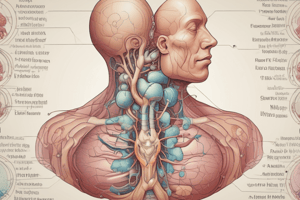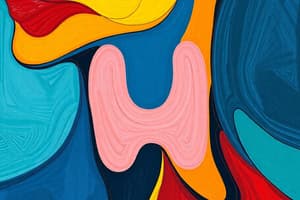Podcast
Questions and Answers
What is the main function of the thyroid gland?
What is the main function of the thyroid gland?
- Produces cortisol
- Regulates blood pressure
- Controls immune response
- Regulates metabolism, growth, and development (correct)
Which hormone is produced in the highest quantity by the thyroid gland?
Which hormone is produced in the highest quantity by the thyroid gland?
- Calcitonin
- Thyroxine (T4) (correct)
- Triiodothyronine (T3)
- Parathyroid hormone
What is the role of the hypothalamus in regulating thyroid function?
What is the role of the hypothalamus in regulating thyroid function?
- Stores thyroid hormones
- Inhibits TSH production
- Releases Thyrotropin-Releasing Hormone (TRH) (correct)
- Releases Calcitonin
Which of the following is a symptom of hypothyroidism?
Which of the following is a symptom of hypothyroidism?
What is a common cause of goiter?
What is a common cause of goiter?
How does calcitonin affect calcium levels in the blood?
How does calcitonin affect calcium levels in the blood?
Which diagnostic test measures pituitary function related to thyroid hormone levels?
Which diagnostic test measures pituitary function related to thyroid hormone levels?
What is a common treatment for hypothyroidism?
What is a common treatment for hypothyroidism?
Which hormone is more active than thyroxine (T4)?
Which hormone is more active than thyroxine (T4)?
Which treatment option is most appropriate for hyperthyroidism?
Which treatment option is most appropriate for hyperthyroidism?
Flashcards are hidden until you start studying
Study Notes
Overview of the Thyroid Gland
- Definition: The thyroid gland is an endocrine gland located in the neck, consisting of two lobes connected by an isthmus.
- Function: It regulates metabolism, growth, and development through hormone production.
Hormones Produced
-
Thyroxine (T4)
- Main hormone produced (about 90%).
- Involved in metabolic processes and growth.
-
Triiodothyronine (T3)
- More active form; conversion from T4 occurs in tissues.
- Plays a critical role in metabolism regulation.
-
Calcitonin
- Regulates calcium levels in the blood by lowering them when necessary.
- Decreases osteoclast activity (bone resorption).
Regulation of Thyroid Function
- Hypothalamus-Pituitary Axis
- The hypothalamus releases Thyrotropin-Releasing Hormone (TRH).
- TRH stimulates the pituitary gland to release Thyroid-Stimulating Hormone (TSH).
- TSH stimulates the thyroid gland to produce T3 and T4.
Disorders of the Thyroid Gland
-
Hypothyroidism
- Underactive thyroid, leading to low levels of thyroid hormones.
- Symptoms: Fatigue, weight gain, cold intolerance, depression.
-
Hyperthyroidism
- Overactive thyroid, resulting in excess hormones.
- Symptoms: Weight loss, rapid heartbeat, heat intolerance, anxiety.
-
Goiter
- Enlargement of the thyroid gland, can be due to iodine deficiency or other factors.
-
Thyroid Cancer
- Various types with differing prognoses; may require surgery, radioactive iodine, or other treatments.
Importance of Iodine
- Essential for the synthesis of thyroid hormones.
- Iodine deficiency can lead to goiter and hypothyroidism.
Diagnostic Tests
- TSH test: Measures pituitary function related to thyroid hormone levels.
- Free T4 and T3 tests: Assess the level of thyroid hormones directly.
- Thyroid antibodies: Check for autoimmune thyroid disorders (e.g., Hashimoto's or Graves' disease).
Treatment Options
- Hypothyroidism: Levothyroxine (synthetic T4).
- Hyperthyroidism: Antithyroid medications, radioactive iodine, or surgery.
- Goiter: Treatment depends on cause; may include iodine supplementation.
Summary
The thyroid gland is vital for metabolic regulation and overall hormonal balance. Understanding its function, disorders, and management strategies is crucial for health and wellness.
Thyroid Gland Overview
- Butterfly-shaped endocrine gland located in the neck
- Two lobes connected by an isthmus
- Responsible for regulating metabolism, growth, and development through hormone production
Thyroid Hormones
- Thyroxine (T4): Primary thyroid hormone, produced in the largest amount (about 90%)
- Plays a key role in metabolic processes and growth
- Triiodothyronine (T3): More active form of thyroid hormone, converted from T4 in tissues
- Crucial for regulating metabolism
- Calcitonin: Hormone that regulates calcium levels in the blood by lowering them when necessary
- Decreases bone resorption by inhibiting osteoclast activity
Thyroid Function Regulation
- Hypothalamus-Pituitary Axis: Controls thyroid hormone production
- Hypothalamus releases Thyrotropin-Releasing Hormone (TRH)
- TRH stimulates the pituitary gland to release Thyroid-Stimulating Hormone (TSH)
- TSH stimulates the thyroid gland to produce T3 and T4
Thyroid Disorders
- Hypothyroidism: Underactive thyroid gland leading to low thyroid hormone levels
- Characterized by symptoms such as fatigue, weight gain, cold intolerance, and depression
- Hyperthyroidism: Overactive thyroid gland resulting in excess thyroid hormone production
- Symptoms include weight loss, rapid heartbeat, heat intolerance, and anxiety
- Goiter: Enlargement of the thyroid gland
- Can be caused by iodine deficiency or other factors
- Thyroid Cancer: Various types with different prognoses
- Treatment may involve surgery, radioactive iodine therapy, or other approaches
Iodine Importance
- Essential for the synthesis of thyroid hormones
- Deficiency can lead to goiter and hypothyroidism
Thyroid Tests
- TSH Test: Measures pituitary gland function related to thyroid hormone levels
- Free T4 and T3 Tests: Assess the direct levels of thyroid hormones
- Thyroid Antibodies: Check for autoimmune thyroid disorders like Hashimoto's or Graves' disease
Treatment Options
- Hypothyroidism: Remedied with Levothyroxine (synthetic T4)
- Hyperthyroidism: Managed with antithyroid medications, radioactive iodine therapy, or surgery
- Goiter: Treatment depends on the underlying cause; may involve iodine supplementation
Studying That Suits You
Use AI to generate personalized quizzes and flashcards to suit your learning preferences.




